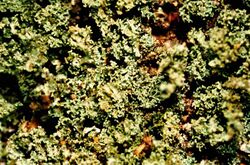Biology:Cladonia parasitica
| Cladonia parasitica | |
|---|---|

| |
| Cladonia parasitica | |
| Scientific classification | |
| Domain: | Eukaryota |
| Kingdom: | Fungi |
| Division: | Ascomycota |
| Class: | Lecanoromycetes |
| Order: | Lecanorales |
| Family: | Cladoniaceae |
| Genus: | Cladonia |
| Species: | C. parasitica
|
| Binomial name | |
| Cladonia parasitica Hoffm. (1796)
| |
| Synonyms | |
| |
Cladonia parasitica, commonly known as the fence-rail cladonia, fence-rail cup lichen[1] or parasite club lichen, is a species of fruticose, cup lichen in the family Cladoniaceae. It was first described by Hoffmann in 1784 under the name Lichen parasiticus, until he reclassified it under the genus Cladonia in 1795.
Description
Cladonia parasitica mainly grows on old oak and pine wood. The thallus is brown or grey. The squamules are minutely divided and look like coral or small scales. When apothecia are present they take the form of small brown morel-like protrusions atop the branches. The species is found in North America and Eurasia in the boreal, boreal-nemoral, and nemoral regions. Cladonia parasitica is considered a red-listed species in Sweden, categorized as (Near Threatened). It is used as a signal species, indicating high-value old-growth forest. [2] Its secondary metabolites include barbatic acid, decarboxythamnolic acid and thamnolic acid. [3]
See also
References
- ↑ "Standardized Common Names for Wild Species in Canada". 2020. https://www.wildspecies.ca.
- ↑ Källén, 2015. https://stud.epsilon.slu.se/7931/7/kallen_i_150521.pdf Environmental variables determining the occurrence of Cladonia parasitica and Hertelidea botryosa, two boreal lichens confined to wood.
- ↑ "LIAS light - Item Descriptions". http://liaslight.lias.net/Descriptions/ItemID_1527.html.
- Hoffm., Deutschl. Fl., Zweiter Theil (Erlangen): 127 (1796)
- Georg Franz Hoffmann 1796 ['1795']. Deutschlands Flora oder Botanisches Taschenbuch. Zweiter Theil für das Jahr 1795. Cryptogamie.: 1–200. Mattick Rec.# 23603 – Recent Literature on Lichens doi:10.5962/bhl.title.126793
External links
- Stephen Sharnoff's Lichen Photos - Cladonia parasitica
- Flechtenbilder (Lichen Images) by Ulrich Kirschbaum -Cladonia parasitica
- The Lichen Herbarium, Natural History Museum, University of Oslo, Norway (Photo Gallery) - Cladonia parasitica
- Lichen Gallery of Leif & Anita Stridvall - Cladonia parasitica
- British Lichens (photo by M. Sutcliffe) Cladonia parasitica
- British Lichens (photo by M. Sutcliffe) Cladonia parasitica
- British Lichens (photo by M. Sutcliffe) Cladonia parasitica
- Lõhmus, P. and Lõhmus, A. (2009) The importance of representative inventories for lichen conservation assessments: the case of Cladonia norvegica and C. parasitica. The Lichenologist 41(1): 61–67.(RLL List # 214 / Rec.# 31169 - Recent Literature on Lichens) (doi:10.1017/S002428290900807X)
- USDA Plant Database
- North American Lichen Checklist
- List of British Lichens & Lichenicolous Fungi
- Brodo, Sharnoff, & Sharnoff. 2001. Lichens of North America
- MycoBank
- Index Fungorum
Wikidata ☰ Q3678923 entry
 |

